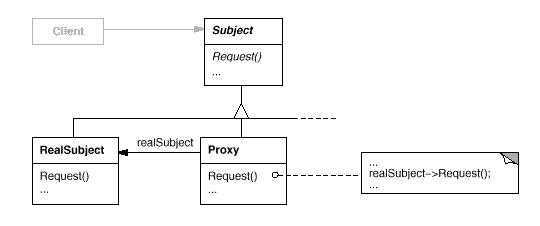2014-05-29 星期四 21:08:37 

Proxy,继续GOF。此模式未按GOF编写。
Provide a surrogate or placeholder for another object to control access to it.
为其他对象提供一种代理以控制对这个对象的访问。
在以下情况使用适配模式:
● 创建开销大的对象时候,比如显示一幅大的图片,我们将这个创建的过程交给代理去完成,GoF称之为虚代理(Virtual Proxy)。?
● 为网络上的对象创建一个局部的本地代理,比如要操作一个网络上的一个对象(网络性能不好的时候,问题尤其突出),我们将这个操纵的过程交给一个代理去完成,GoF称之为远程代理(Remote Proxy)。
● 对对象进行控制访问的时候,比如在Jive论坛中不同权限的用户(如管理员、普通用户等)将获得不同层次的操作权限,我们将这个工作交给一个代理去完成,GoF称之为保护代理(ProtectionProxy)。
●智能指针(Smart Pointer),关于这个方面的内容,建议参看Andrew Koenig的《C++沉思录》中的第5章。
?
Proxy模式最大的好处就是实现了逻辑和实现的彻底解耦。
?智能指针的
|
1
2
3
4
5
6
7
8
9
10
11
12
13
14
15
16
17
18
19
20
21
22
23
24
25
26
27
28
29
30
31
32
33
34
35
36
37
38
39
40
41
42
43
44
45
46
47
48
49
50
51
52
53
54
55
56
57
58
59
60
61
62
63
64
65
66
67
68
69
70
71
72
73
74
75
76
77
78
79
80
81
82
83
84
85
86
87
88
89
90
91
92
93
94
95
96
97
98
99
100
101
102
103
104
105
106
107
108
109
110
111
112
113
114
115
116
117
118
119
120
121
122
123
124
125
126
127
128
129
130
131
132
133
134 |
// TestProxy.cpp : Defines the entry point for the console application.//#include "stdafx.h"#include <assert.h>#define KSAFE_DELETE(p) \ if
(p) \ { \ delete
p; \ p = NULL; \ }class
KRefCount{public: KRefCount():m_nCount(0){}public: void
AddRef(){m_nCount++;} int
Release(){return
--m_nCount;} void
Reset(){m_nCount=0;}private: int
m_nCount;};template
<typename
T>class
KSmartPtr{public: KSmartPtr(void) : m_pData(NULL) { m_pReference = new
KRefCount(); m_pReference->AddRef(); } KSmartPtr(T* pValue) : m_pData(pValue) { m_pReference = new
KRefCount(); m_pReference->AddRef(); } KSmartPtr(const
KSmartPtr<T>& sp) : m_pData(sp.m_pData) , m_pReference(sp.m_pReference) { m_pReference->AddRef(); } ~KSmartPtr(void) { if
(m_pReference && m_pReference->Release() == 0) { KSAFE_DELETE(m_pData); KSAFE_DELETE(m_pReference); } } inline
T& operator*() { return
*m_pData; } inline
T* operator->() { return
m_pData; } KSmartPtr<T>& operator=(const
KSmartPtr<T>& sp) { if
(this
!= &sp) { if
(m_pReference && m_pReference->Release() == 0) { KSAFE_DELETE(m_pData); KSAFE_DELETE(m_pReference); } m_pData = sp.m_pData; m_pReference = sp.m_pReference; m_pReference->AddRef(); } return
*this; } KSmartPtr<T>& operator=(T* pValue) { if
(m_pReference && m_pReference->Release() == 0) { KSAFE_DELETE(m_pData); KSAFE_DELETE(m_pReference); } m_pData = pValue; m_pReference = new
KRefCount; m_pReference->AddRef(); return
*this; } T* Get() { T* ptr = NULL; ptr = m_pData; return
ptr; } void
Attach(T* pObject) { if
(m_pReference->Release() == 0) { KSAFE_DELETE(m_pData); KSAFE_DELETE(m_pReference); } m_pData = pObject; m_pReference = new
KRefCount; m_pReference->AddRef(); } T* Detach() { T* ptr = NULL; if
(m_pData) { ptr = m_pData; m_pData = NULL; m_pReference->Reset(); } return
ptr; }private: KRefCount* m_pReference; T* m_pData;}; |
● 适配器模式Adapter
适配器Adapter为它所适配的对象提供了一个不同的接口。相反,代理提供了与它的实体相同的接口。然而,用于访问保护的代理可能会拒绝执行实体会执行的操作,因此,它的接口实际上可能只是实体接口的一个子集。
● 装饰器模式Decorator
尽管Decorator的实现部分与代理相似,但Decorator的目的不一样。Decorator为对象添加一个或多个功能,而代理则控制对对象的访问。
设计模式之十二:Proxy(代理)—对象结构型模式,布布扣,bubuko.com
原文地址:http://www.cnblogs.com/freezlz/p/3762794.html